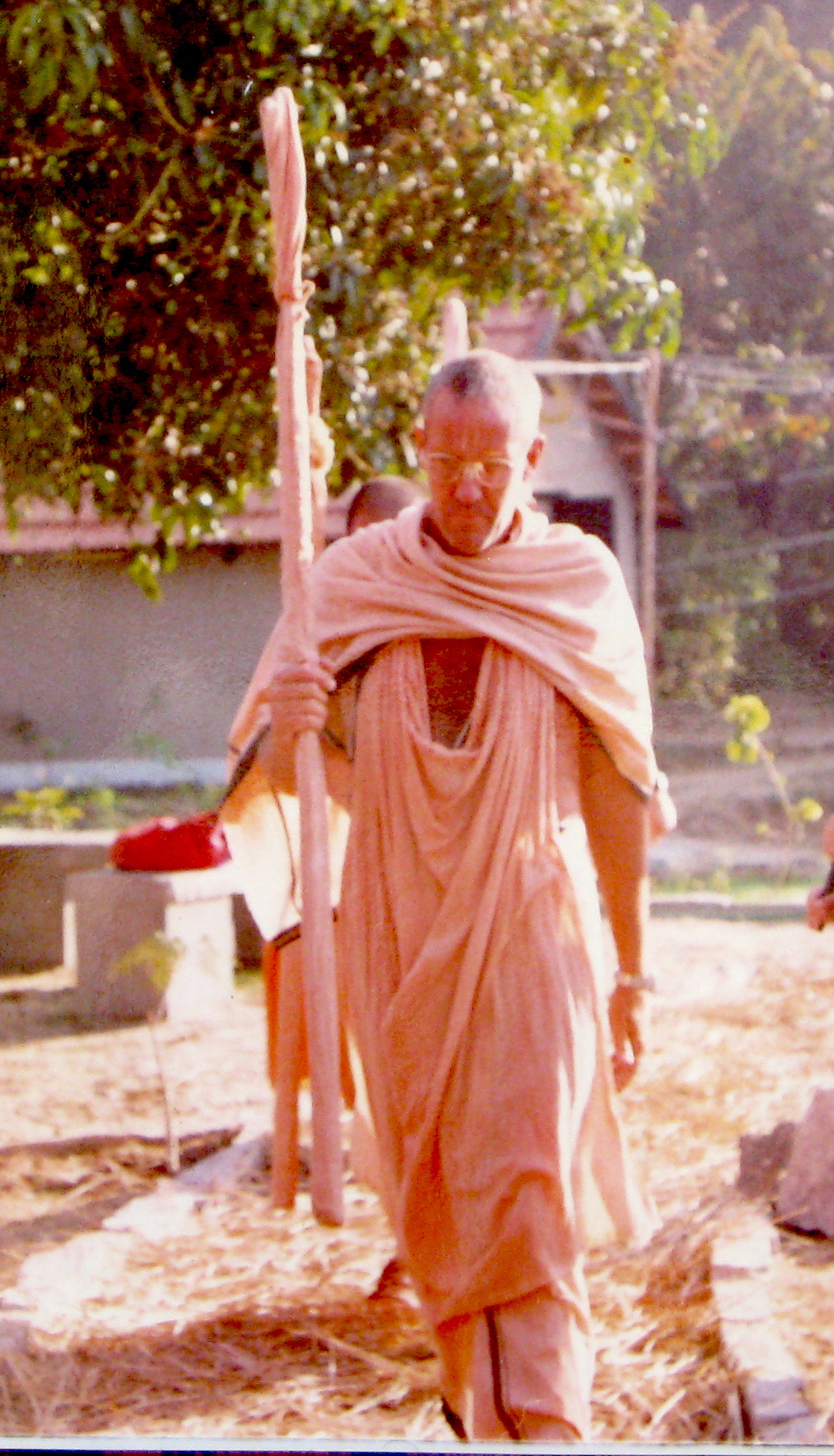
(Taken from an informal conversation at Saraswatipuram, Mysore, in the year 1996)
God-brother: What's our idea out there? It’s a wonderful piece of property situated on the banks of the Kaveri river.
Guru Mahārāja: Haven't wondered about that myself. When our boys first got there, they would swim. But it would be better to see people get in the mood of taking a sacred bath in the river than just going down swimming and having fun. Because in that kind of mood, I can just tell you that if you have the enjoying spirit, you'll fail in India. You can't serve, you won't make it. Because, for one, there's not that much to enjoy. The second is Kṛṣṇa doesn't allow it, at least for us. He may allow it for the Hindus to some extent. So everybody have to know by themselves that it's for my spiritual life that I'm coming here. And spiritual life means some renunciation. It's a golden opportunity. There's only one country that you can be surrounded by an environment which is more favourable, although there are hostile things everywhere, still, by and large the environment for Kṛṣṇa consciousness in India is more favourable than not favourable. Especially once you make the transition and adjust your living standards. We were once sitting at Lakshmi Thathachariar's office, one of the founders of Academy of Sanskrit Research in Melukoṭe. It was as opulent as this house. His house was a little more traditional, a brahmins home with good standards. He said you can have satellite dish in Melkote as well, if you want to spoil your life.
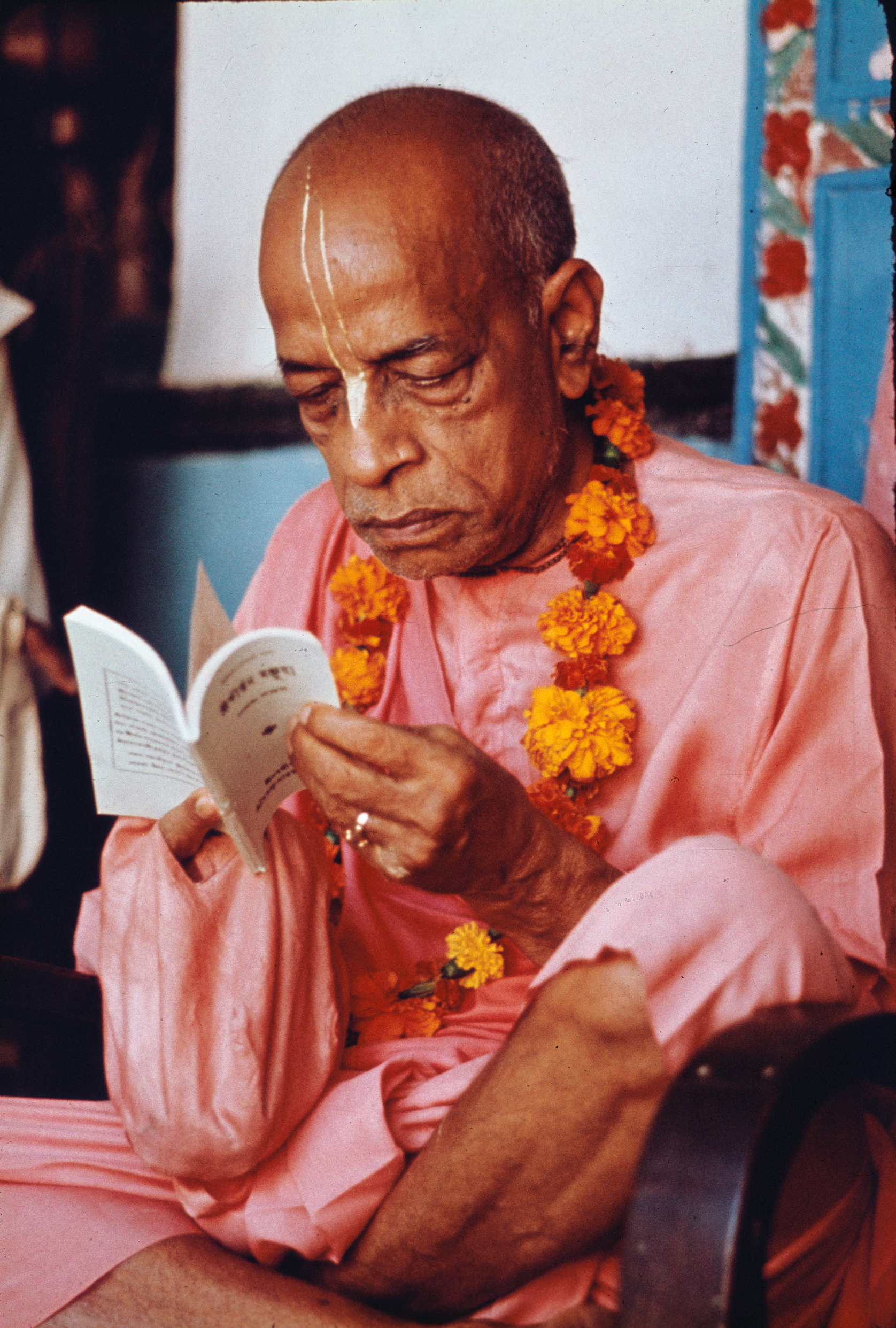
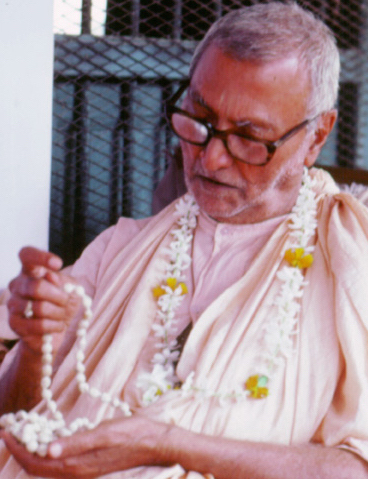
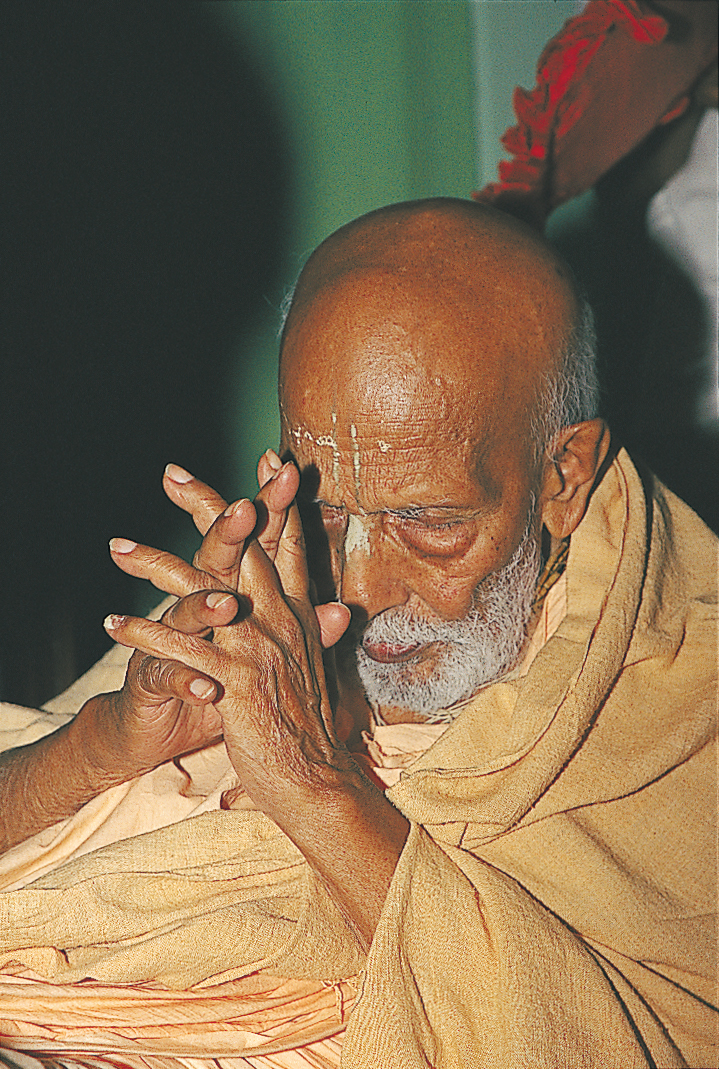
God-brother: What do you want us to learn? What's your vision and desires for that project?
Guru Mahārāja: I’ll put it in this way — You've come here to put to practice what you read about in Śrīla Śrīdhara Mahāraj's books and Śrīla Puri Mahāraj's and in Śrīla Prabhupāda’s books. That's the reason you've come here, to put it into practice. To live it. To become a deep thinker. To try to enter into the substantial realm of Kṛṣṇa consciousness. Not to solve your economic problem. Not just to get your kids away from the Western demoniac influence. All those things are there. They come with the bouquet, but they're secondary ornaments to the main ornament. If you don't follow the main thing, the others, they wilt after a while anyway. No, they're not the substantial things that can keep the project going or keep you interested.
In India, even common field workers stand-up and fold their hands when we drive by. But still, secular India is not why we're here. I'm here because Śrīla Prabhupāda asked me to be here. I do hate the smog, the noise, the buses etc. The planes are never on time as much as anybody else isn’t. But that's not why I'm here — for some convenient living. I originally came here because Śrīla Prabhupāda asked, “How do you like India?” I made the mistake, I said, “I like it.” He said, “Ok, you stay here.” In a nutshell, that's what happened. And I don't want to stay here alone so I need good association like all of you. So anyway, that's the goal, the project.
You've been to Rupanuga Bhajan Ashram in Vṛndāvana a couple of times. What is it? It's a place where we worship the deities, and we can talk about Kṛṣṇa all day long. Of course, this is not Vṛndāvana. But as far as lifestyle goes, when you are in India, it should be like that. That’s the project, but getting there is another thing. You have to go through something to get to the better situation. Why we come and how we should live while we're here should be focused on the important things of Kṛṣṇa consciousness. You go to Vṛndāvana and once you live there six months, you know what is Vṛndāvana. You go there as a tourist, you only get the flickering lights of Vṛndāvana.
Bathe once or a thousand times in the Kaveri, bathe in the Ganges, the things that you read in the books, you do them, see them, follow in the places of Mahāprabhu's lila, going to places where the great souls have gone. It might catch on to your kids, but they're not even in India, just in their own little worlds. If they're playing baseball here, it’s the same baseball, but someone's not going to yank them and call them over the sideway and say, "Hey man, want some crack?" If they're playing baseball in America, someone's going to pull them over the third baseline and smoke their brains out sooner or later. That's the only difference. I'm not faulting it. I'm just giving you a clear example. So we can also be in the non-spiritual part of India (and stay away from western influences). But we're very close to Vṛndāvana, very close to Mayapur, and very close to places where Caitanya Mahāprabhu, the greatest personality, and other great personalities have come and gone.
In Śrīla Prabhupāda's own words, he said an ant in India is a higher birth than the President of the United States. And then he qualified it by saying, because Lord Rāmacandra, Lord Kṛṣṇa and so many Viṣṇu avatars have had their pastimes all across the Bhāratavarśa where the seven holy rivers flow. And he said a Rickshawala in Vṛndāvana is getting infinite more benefit than the President of the United States. The Rickshawala is taking you to Rādhā Dāmodara, Rādhā Shyāmasundara etc. You come out and give him some mahāprasādam. He is staying there year after year in the dhāma. So the benefit that is available through the holy places, we're here for that purpose, also for serving purpose. We're here for that. We're here for the holy places. And we're here for the benefit of our families, the children, etc. There are many, many reasons for being here.
The other day someone said that this place looks nice, but what if other people want to come here and there’s isn't enough land? But really, not many would want to come and settle here. The reason is because it doesn’t matter how beautiful the land is or how much money a person has or doesn't have, or any of those things. These are not the qualifications to come here. Someone may have a little bit of appreciation for Śrīla Śrīdhara Mahārāja, but a little bit isn't enough. I'm looking for the fanatics. I mean to say, people who have some feelings and their hearts are really moved by his words. They want to somehow embrace it or want to serve it. But just to have people coming in because they have some money, that isn’t going to be happy. I wouldn't be happy. You wouldn't be happy with that either.
And I hope that we never do voting on this and voting on that. These things don't exist in our association. One is, it is too small, therefore voting is not required. The voting process means this—one section of us gets to do what we want, and it's just too bad for the rest of us. That's the meaning of vote. One party wins and one party loses. It's not necessary. Things have to be discussed at length if necessary.
Some people say, “Once you get big, you’ll have the same problems that ISKCON have.” We are not going to get big. Now how do you like that? So we solve that problem right off the bat. No, we are not going to get that big. We are happy with that. Some other problems might arise, but we're not going to relive that scenario again — all those kinds of corruption, just working and making money and just blowing it like anything. There’s so many things that you hear about—that can't be our case and it hasn't been our case yet.
So, the first qualification is to really have some appreciation for Śrīla Śrīdhara Mahārāja at least through his books and somehow or other they should have had a big change of heart and a big feeling in that way. Same time, they also have to have that feeling for Śrīla Prabhupāda or similarly, it can be different. The love we have for one person is not the same as we have for another. It's because we're individuals and our affection for each individual is different. But that also has to be there. Someone just can't be in our group who's totally into Śrīla Śrīdhara Mahārāja, but has no regard for Śrīla Prabhupāda. That just won't work.
Then the individuals have to have some regard for myself. This isn't going to be developed like ISKCON where people sitting in the back room criticize and find fault with the leaders. If you see fault with the leaders then you should get out of here as fast as you can. Why would you want to be with a faulty leader.
Then there is another Vaiṣṇav association — Śrīla Puri Mahārāja also is in our group. If someone came and said they were disciples of Śrīla Puri Mahārāja, before they could be close with us, they would have to have an appreciation of Śrīla Śrīdhara Mahāraj. If they had even a small portion of the appreciation that Śrīla Puri Mahārāja has for Śrīla Śrīdhara Mahārāja, then it would be a grand one, because his appreciation is one of the best.
But, we wouldn’t try to make that description complete, like this has to be lined up, that has to be lined up etc. But for sure, just a Prabhupāda disciple cannot be happy here without having an affiliation and regard for Śrīla Śrīdhara Mahāraj. That is one of the main things. Everybody has respect for Śrīla Prabhupāda. But about Śrīla Śrīdhara Mahārāja, that is something very special.
A mission is comprised of many people. You look at the old photos of Śrīla Bhaktisiddhānta, many householders are there with him. There are children there with him. We see in a big convertible car, there is a little girl in the front, and he's in the backseat. I've met people who took initiation from Śrīla Bhaktisiddhanta when they were 12 years old, 15 years old and things like that. But they won't come in the ashram playing baseball or cricket. In the ashram that’s not allowed. At the temple that's just not allowed. So somehow or another, we'll have to balance the kid's life in an ashram or it won't work. It's like the Ashram and the kids become enemies of each other. So that has to be somehow organized. That’s management and that's not something like the principal and spirit of the mission. That's management — managing things properly. So given those parameters and all, we don't expect a big ocean of people.
Śrīla Śrīdhara Mahārāja describes that the relative consideration is like an economic thing, whereas the absolute consideration is the service line, the line of Śrī Rūpa and Śrī Raghunātha, which is represented by Śrīla Bhaktisiddhānta. We can never accept an unfavourable situation against the proper flow, but we can accept any financial situation, any material situation, like education of kids. Different devotee families have different standards, but the one common standard is that Kṛṣṇa consciousness can save the children from birth and death. However, everybody is being educated differently all over the world. We all got our opinions and statements about education. But Bhagavad-Gītā, the rāja-vidya, that’s the king of education. So the other education is secondary whereas the rāja-vidya is primary. But if the other education becomes primary and the rāja-vidya becomes secondary, then you're not actually doing them any good. We have so many considerations for ourselves, but the real consideration should be from the absolute side — how much I'm going to be able to increase my Kṛṣṇa consciousness, how much association I'll get here and what opportunities I'll get in that way.
God-brother: It’s just nice to hear more about what you envision the project to be, like five years down the road. You've got a feel for it. We're all here working with you, for whatever it's going to be.
Guru Mahārāja: Well, there are two things. There's what happens when the gates open and what happens when the gates close. We have an obligation to preach. I say we because anybody that has been preached to has got to preach. It's like the living have an obligation to promote life, and the healthy have an obligation to heal the sick. Similarly we have an obligation to preach to everyone. Śrīla Śrīdhara Mahārāja has expressed, “My nature is reclusive, still I have my obligation. So I try to create a situation where I would be available. But I did not avail myself always.” But he was available and never denied anybody. He just didn't go out campaigning like anything. Of course, some people take the position that everybody has got to be as forceful as Śrīla Prabhupāda was. But then there wouldn't be any speciality left. Then that's the way everybody would be. But, Śrīla Prabhupāda’s campaign was a special feature.
Pretty much everybody here is over the halfway mark of their lives. So think about it. That's where the gates are closed. I’d like to chant the holy name. I wouldn’t want to preach to some neophyte that Gaṇeśa is not the supreme and that you're not God. So
the gates are going to remain closed a lot. It's six and three quarter days for us, and a quarter day a week for the public. I don’t really care about the public, but you’ll find that the good people will make their way in. So it's like you just say, “No! No!”, and the best ones will still get in, “Oh, you're in! Ok, nice. What's your name?” Like in the old days when the disciples asked for initiation, the guru always said “No”. In the Zen tradition, that is just a part of the tradition. The students went to a Zen monastery, bowed down at the gate, and rang the bell or something. The Zen master comes out and asks him, “What do you want?” And then he says, “I wish admittance into the monastery to be a monk.” And then the master says, “No. Go back to your home” and he shuts the door. Then the person's supposed to bow down and keep their head there until he opens the door. Well, they do that now symbolically. They wait 10 or 15 minutes to open the door and they say, “Yes, you may enter the monastery.” But in reality, they used to stay there waiting for a week or just as long as they wanted until they went home. And the ones who didn't go away, they were ready to die right there on the doorstep, and just before they died, they would take him up and bring him inside. They would revive him back to life and they could become monks. Now everything is just so fast. But originally when Śrīla Bhaktisiddhānta went to Gaurakiśora for initiation, he just told him, “No, go away!” And then Śrīla Bhaktisiddhānta threatened to kill himself and almost was on the verge of attempting a suicide, then Gaurakiśora accepted him. He had gone back and told his father that Gaurakiśora had rejected him. Śrīla Bhaktivinoda Ṭhākura had said, “If he has rejected you, there's no purpose of your living. You must capture him, you must get his attention.” So the disciple has to catch the attention of the guru in some sincere way, not just by getting in the way, but by doing something sincere. Like Narottama Dāsa approached Lokanātha Dāsa Goswāmī and Lokanātha Dāsa Goswāmī told him, “No, go away.” Then wherever Lokānātha Goswāmī went in the field, in the forest, to pass stool, Narottama Dāsa, the prince of Manipur, would come and clean the place where he had passed stool. He would also tidy up around his hut. Then Lokanath Goswāmī observed that something was wrong. He hid in the bushes and then he saw Narottama Dāsa, the prince of Maṇipur, coming and trying to render service. Then he accepted him as his disciple.
So, we're not just imitating, but I found that you don't just try to get everybody in, be a little exclusive, not out of false pride, but because we got better things to do. I need to chant the holy name. Śrīla Puri Mahārāja told us last year, don’t know if you were in the room, he said, “You must chant sixty four rounds.” We have so many excuses why we cannot do that. But it's the order of Sarasvatī Ṭhākura. You must do that. So I've taken it as a sort of a sadhana objective. Not this year, but to increase my chanting so that after a certain time I should be chanting the holy name fifteen, sixteen hours a day, maybe talking four or five hours a day, and the balance for eating and sleeping.
The devotees are chanting, reading books and that'll be the life. And certain people will come whom we preach to, not just every person with a sugar cane knife, but we're looking for a certain level of people. You just have to be here and the people will come to us, and whoever wants to preach can be involved in that. We will publish some books in Kannada. I had a meeting with a god-brother, and we discussed my ideas. And the one that he liked the best was publishing Brahmasaṁhita in Sanskrit and in Kannada, with that book you're targeting a very educated upper class of people. And then for other people to do a selected hundred and eight or so verses from the Bhagavad Gītā in Kannada, a short book with an introduction of who is Lord Caitanya Mahāprabhu and what is Kṛṣṇa consciousness and Bhakti yoga.
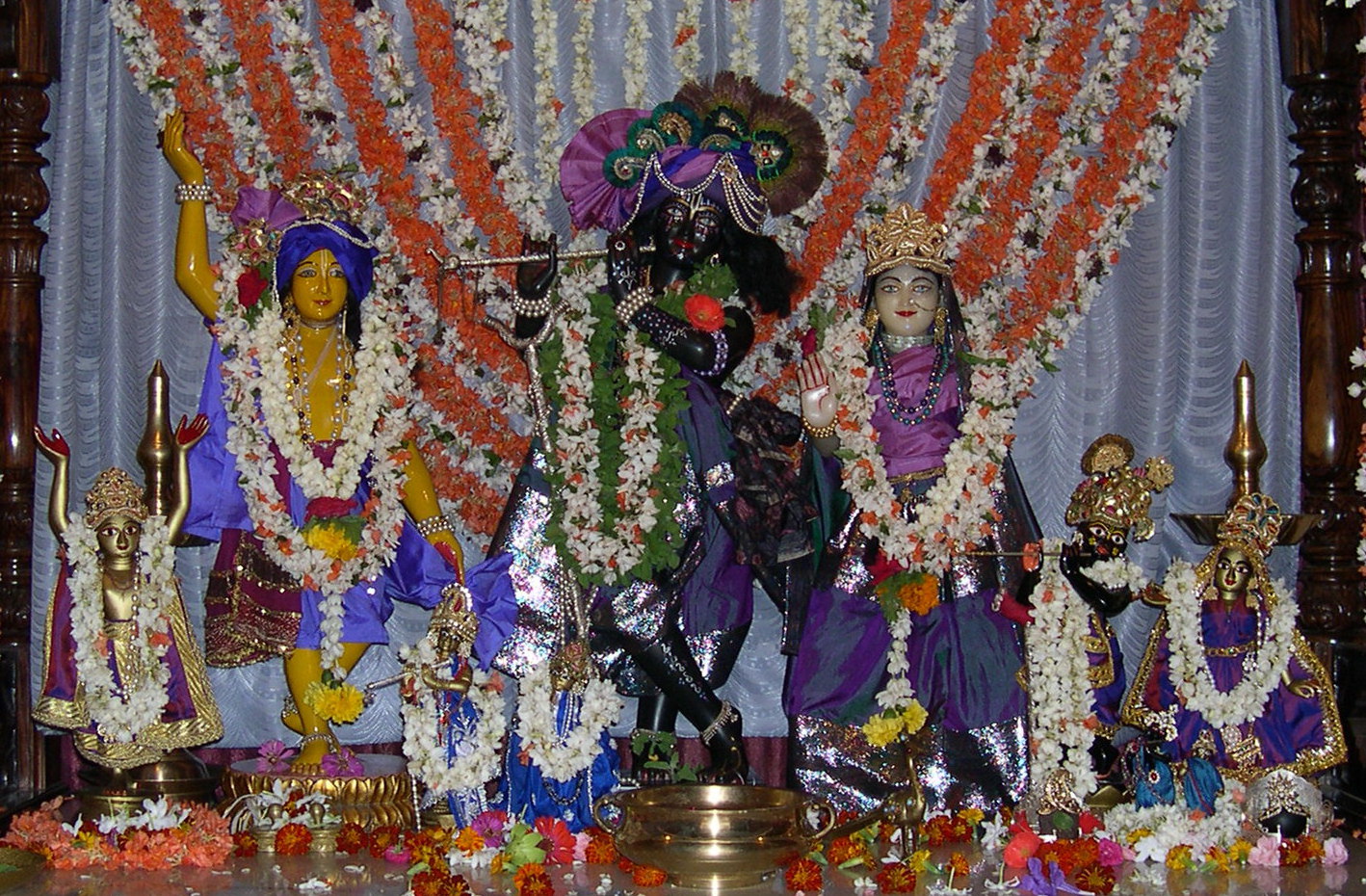
God-sister: Talking about the deities, we have Lord Caitanya here. Is He going to be worshipped along with Rādhā and Mādhava?
Guru Mahārāja: Yes.
God-sister: Why not worship Him along with Lord Nityānanda?
Guru Mahārāja: When Śrīla Prabhupāda went to open the Jhansi preaching center, he brought a deity of Caitanya Mahāprabhu. Śrīla Prabhupāda gave a big emphasis to Gaura Nitāi in the west because they delivered Jagai and Madhai who were class ‘A’ drunkards and sinful rascals, and that's who he came to deliver. I don't want to even remember my past. I was a classic rascal, sinful dog, and so great is the mercy. In India we're not talking about exactly all those kinds of people, although they got Jagai and Madhai from India, but nonetheless, delivering the fallen. Also Lord Nitayananda is very merciful. Without the mercy of Lord Nityananada one cannot worship Lord Caitanya. Therefore, who's worshipping Lord Caitanya, we understand they may have the mercy of Lord Nityānanda, otherwise you cannot worship Caitanya without His mercy.
So generally, when the devotees are worshipping Caitanya Mahāprabhu, they are seeing and focusing on mahāprabhu śrī caitanya rādhā kṛṣṇa nāhe anya. They're seeing the mood of Rādhārānī in Caitanya Mahāprabhu. And when Gaura Nitāi are being worshipped, He is seen more as Kṛṣṇa and Lord Nityānanda as Balarāma. Gaura Nitāi are Kṛṣṇa and Balarāma. And when they are worshipping Gaura Gadādhar, they're seeing that Caitanya Mahaparbhu is Kṛṣṇa and that Gadādhara is Rādhārānī, Rādhā bhava. Mahāprabhu has the kānti, the complexion of Rādhārānī and Gadādhara Panḍita has got the bhāva of Rādhārānī. One day Śrīvāsa Ṭhākura made an arrangement that Lord Caitanya Mahāprabhu sat on His throne in Navadvip. Then by some tricky arrangement, they made Gadādhara Panḍita to sit next to him. Advaita Ācārya did the ārati, worshiping them as Rādhā Kṛṣṇa. Because that’s who Gadādhara Panḍita is. He is the bhāva of Śrīmatī Radharani, the devotional mellow of Śrīmatī Rādhārānī. He doesn't just have it. That's what He is. So, when Caitanya Mahāprabhu is worshipped like this, then generally Rādhā and Kṛṣṇa are coming soon. And when they're together, then Lord Nityānanda can't be there. Lord Niyananda cannot stand on the same altar as Rādhārānī.
In Māyāpura, there is Rādhā Kṛṣṇa, Gaura Nitāi, Gaura Gadādhar, Jagannātha Subhadra Baladeva, Pañcatattva, and many other deities. What is the ultimate? In other saṁpradāya, there is Lakṣmī Nārāyaṇa forms, there is Nṛsimha dev, Varāha, and many other forms. But it finally starts to focus down on Mahāviṣṇu and Lakṣmī, Mahāviṣṇu, with Śrīdevī and Bhūdevī. You have seen in Śrīraṅgam and Śrīraṅgapatna. So in our saṁpradāya what does it actually come down to? What is the focus? Although other things are there, what does it begin to focus more and more on? And that is Caitanya Mahāprabhu as Rādhā and Kṛṣṇa. Caitanya Mahaparabhu standing with Rādhā Kṛṣṇa and that's what Śrīla Prabhupāda established in Māyāpura, as did Śrīla Bhaktisiddhānta. You'll see this everywhere, you'll see in Śrīdhara Mahāraja's temple, you'll see in Śrīla Puri Mahārāja's temple, you'll see in each and every temple in our saṁpradāya, this deity configuration — Mahāprabhu and Rādhā Kṛṣṇa. In Māyāpur, which is the base centre of the worldwide International Society for Kṛṣṇa Consciousness, Śrīla Prabhupāda established Mahāprabhu and Rādhā Madhava, not Nityānanda. But that conception was later lost and confused. Śrīla Śrīdhara Mahārāja encouraged us in that way — starting a centre with Mahāprabhu and later bringing Rādhā Kṛṣṇa, if it grew.
When some devotees heard about the focus being Mahāprabhu Rādhā Govinda, they really got into it to the point that they almost started criticizing ISKCON for having Gaura Nitāi, thinking that it is a lower conception. They wouldn't pay attention that after so many lectures, Śrīla Śrīdhara Mahārāja goes, “Dayal Nitāi, Dayal Nitāi, Nitāi Caitanya!” He is always chanting the name of Nityānanda, and they never caught on to that.
In front of his temple there's a pond which is a part of Śrī Caitanya Sarawata Math. He wanted to make a temple there. So the devotees were thinking that it would be for Mahāprabhu Rādhā Govinda or something like that. And one day Śrīdhara Mahārāja told them to install Gaura Nitāi in the temple. They were like “Gaura Nitāi?”, “Yes, Gaura Nitāi.” So don’t follow with your mind, follow with your heart.
Gaura Nitāi are wonderful, but what has been missing in the world wide mission. If we never put Gaura Nitāi, have we failed to contribute something? Gaura Nitāi are there everywhere. They see Mahāprabhu Rādhā Govinda only when they come to our temples. Ninety eight percent of our preaching is towards ISKCON. As disgusted as we get from time to time, we just keep putting our thoughts towards it, because that's the biggest community of devotees. But have they never heard of Gaura Nitāi? Do we show them Gaura Nitāi to give them what they're lacking? No, they’ve missed something that we want to supply—the information that they’re lacking that we want to supply.
Devotees also went on chanting parties with Gaura Nitāi. No offense is taken by Gaura Nitāi. They are very merciful and very kind. So considering these things Śrīla Prabhupāda gave the devotees, Gaura Nitāi. We also have Gaura Nitāi deities in our mission. So we don't consider everything from a single point of view. In so many temples of the followers of Śrīla Bhaktisiddhānta, you'll find Gaura Gadādhar. If the person is staying in the line, certain things happen, certain feelings develop, and it definitely develops as an interest in Gaura Gadādhara.
In reality, hearing is where we find our connection. Hearing is śravaṇam, which is the most essential part of the process. And then repeating what you’ve heard is the kīrtana—either repeating that or by chanting the holy name. You should come here and try to increase your chanting of the holy name and the discussion of Kṛṣṇa consciousness, taking up some service on the property, the āśrama, the garden, service to the Vaiṣṇavas. I’m speaking idealistically, but as far as the ideal can be achieved, that’s success.
